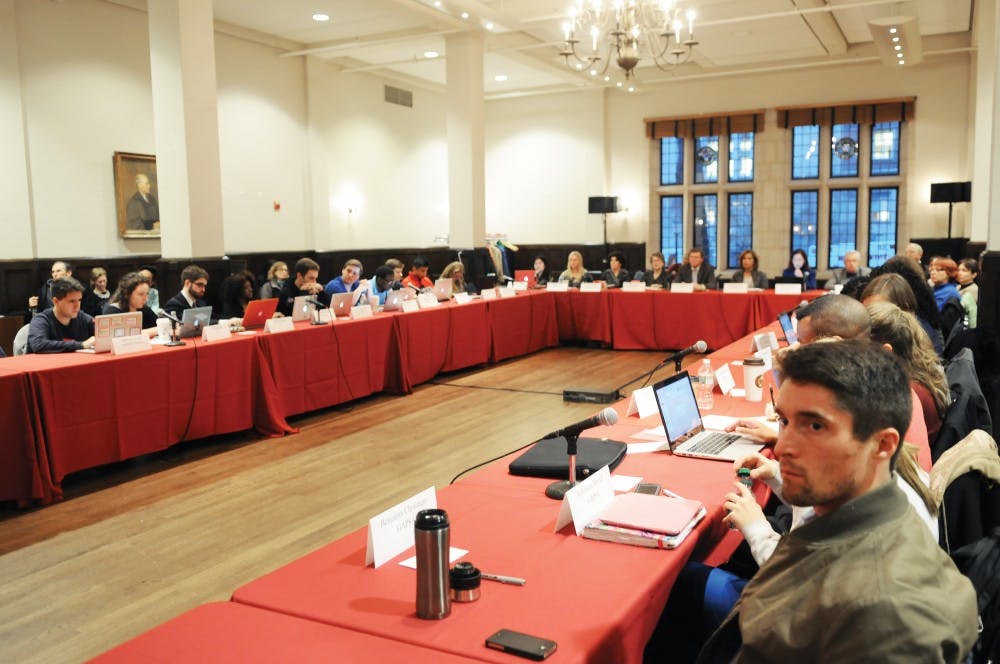Last Friday, the Nominations and Elections Committee opened applications for nine seats on the University Council to student groups at Penn that feel mis- or underrepresented.
Opening this number of seats on the University Council to representatives of these groups has become a customary practice for the NEC over the years. A semester-long election process is held annually to fill the seats. In the past, these seats have been allocated to student organizations such as the 5B — umbrella organizations that represent minority groups on campus — and the Penn Association for Gender Equity.
Vice Chair for Nominations and College senior Samantha Rahmin said the importance of these seats lies in the voice that they lend to groups at Penn that have issues they feel need to be addressed.
“It’s my personal belief that if you come to me saying you’re mis- and underrepresented, you are mis- and underrepresented and deserve to have a seat on the council,” Rahmin said.
In the past, groups have used their seats to push through projects such as the Muslim Student Association’s initiative to have halal food in a dining hall at Penn.
College senior Brianna Krejci, who previously served as a PAGE representative on the University Council, said that the NEC was integral to facilitating communication between the school administration and the student body.
“I think they are an essential part of the process,” Krejci said. “You need a body to put some order on the process of being on the University Council.”
The NEC receives numerous applications every year that they assess on what they call “A to J” criteria. These selection guidelines consider factors that stretch beyond the basic characterization of being mis- or underrepresented. The NEC also considers, for example, what issues the group could bring to the University Council in the coming academic year.
In addition to the nine primary undergraduate seats chosen by the NEC, the committee also negotiates with the Undergraduate Assembly to allocate the remaining three “flex seats” to groups they feel had strong applications and clear agendas.
In past years, the NEC has often found it difficult to coordinate effectively with the UA to designate these flex seats to student representatives. Vice Chair for Nominations and Wharton sophomore Caleb Carter said that this was due to the lack of an official process to determine how the seats should be allocated.
UA Communications Director Michael Krone confirmed in an email that these flex seats “can be allocated by the UA or the NEC depending on the conditions that year.” He went on to say that the UA and NEC work together and take into account a number of considerations to ensure that the final allocation best represents the undergraduates on the UC.
“In the past two years it has gone poorly,” Carter said. “There is no guideline in the Penn Student Government constitution to say how the three seats should be allocated.”
Krone pointed out that rather that there is no unifying PSG constitution, only ones for individual branches, like the UA constitution available on the UA website. It does not outline a process for designating flex seats.
Carter added that the difficulties faced in the negotiations process between the NEC and the UA were due to the conflicting goals of the two groups.
“I guess there are competing tensions,” Carter said. “We aim to have the maximum representation of the underrepresented, whereas the UA wants to represent by majority.”
Carter and Rahmin also said that while a seat on the University Council would allow a representative to speak during meetings, there are other ways for groups to get involved with both the council and the NEC, regardless of whether they are allocated a seat on the council.
The NEC holds pre-meetings before every University Council session that are open to all undergraduates. These sessions provide an opportunity for groups without seats on the council to familiarize themselves with the council’s agenda and voice concerns that could be presented on their behalf by a representative of a group who holds a seat.
“We want them to have an impact,” Carter said. “That means we’re doing our job well.”









